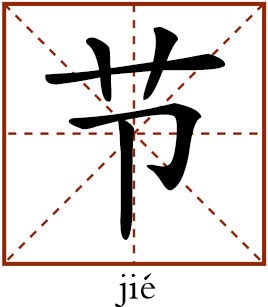Festival

This character has various meanings. It usually refers to a knot or joint, a festival, a division or moral integrity.
落花时节又逢君
luò huā shí jié yòu féng jūn
Hua refers to blossoms and luo means “to fall.” Shi jie means the time or season. You means “again.” Feng means “to meet” and jun is the respectful address for friends.
This is the last line from the poem, “On Meeting Li Guinian in the Region South of the Yangtze River,” by the great Tang poet Du Fu (712–770). In 755 during An Lushan’s Rebellion, Du Fu experienced extreme personal hardships. He spent most of his life wandering aimlessly, finally dying in poverty and hunger. This poem was composed in 770 and he passed away in the same year. In the scenic Jiangnan area, Du met an old friend who he had been parted from for over 40 years. Overwhelmed by mixed feelings of grief and joy, Du composed this poem. “I always used to see you at Prince Qi’s mansion,/ heard you how many times at Lord Cui’s home?/ Now when the scenery is finest here south of the Yangtze,/ that we should meet once more just as blossoms are falling!” (trans. Burton Watson)
The first half of the poem depicts Du’s memories of how he became acquainted with Li Guinian during the Kaiyuan Era (713–741), one of the golden ages of Chinese history. Li was a famous singer who had enjoyed favor under Emperor Xuanzong. Prince Qi was a young brother of Emperor Xuanzong and a noted patron of the arts. Lord Cui was a favorite courtier of Emperor Xuanzong. The residences of Prince Qi and Lord Cui used to be the gathering place of talented artists, literati and other celebrities during the heyday of the Tang Dynasty. As a young poet favored by the authorities, Du used to be a fixture of these places, thus becoming friends with Li Guinian, who was often invited to sing for those celebrities. The last half of the poem reflects Du’s mixed feelings triggered by his reunion with Li. Although the scenery in the Jiangnan area was as beautiful as before, successive years of warfare had made the situation of their motherland inevitably decline, and both of them had led vagrant lives. When they saw each other in the season when blossoms were fading away, they may have been overcome with emotions. Only the composition of poems allowed them to express their feelings adequately.
edited by REN GUANHONG
